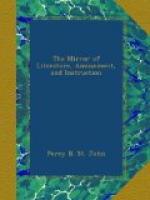never was he so contented as when rambling through
the streets and walks, without his gown, in a new and
well cut suit; whilst in order eternally to display
his figure to the best advantage, he was content to
endure as heavy an infliction of fines and impositions,
as the heads of his college could lay upon his shoulders.
He was ruined for a reading-man. About this period
he also had a perfect mania for flowers; observing
which, and fancying I might gratify my friend by such
a mark of attention, I one day went to his rooms with
a large bouquet in either hand. He was not at
home; but having carelessly enough forgotten to lock
his door, I commenced, con amore, (anticipating
the agreeable surprise which I should afford him)
to fill his vases with fresh, bright, and delicious
summer flowers, in lieu of the very mummies of their
race by which they were occupied. My work was
in progress when Millington returned, but, oh! good
heavens! the rage, the profane, diabolical, incomprehensible
rage into which he burst! I shall never forget.
Away went my beautiful, my fragrant flowers, into
the court, and seizing upon the remnant of the mummies,
as yet untouched by my sacrilegious fingers, he tossed
them into a drawer, double locked it, and ordered
me out of the room. Dreading a kick, I was off
at his word; but had not proceeded half way down stairs,
when a hand from the rear, roughly grasped mine, and
a voice, in a wild and hurried manner, asked pardon
for “intemperance.” I should have
called it madness. We were again firm allies;
but I resolved to fathom, if possible, the mystery
of the flowers. I now observed, with surprise,
that Millington never quitted his rooms without a
flower in his hand, or boutonniere; which flower,
upon his return, appeared to have been either lost,
or metamorphosed into, sometimes, one of another description;
sometimes into a nosegay. Very strange indeed,
thought I; and began to have my suspicions that in
all this might be traced “fair woman’s
visitings.” Yes, Millington must decidedly
have fallen in love. He was never in chapel, never
in hall, never in college, never at lectures, and
never at parties; he was in love, that was certain;
but with whom? He knew none of the resident gentry
of ——, and he was far too proud to
involve himself in “an affair” with a
girl of inferior rank. Many men did so; but Millington
despised them for it. Accidentally I discovered
that he adored Julia, the young, sweet daughter of
an undoubted gentleman, who was not yet “come
out.” She was a lively, pretty brunette,
with brownest curling hair, only fifteen; and to this
day, I believe, knows not the name of her lover.
From an attic window of a five storied house, this
fond and beautiful girl contrived, sometimes, to shower
upon the head of her devoted admirer sweet flowers,
and sometimes this paragon of pairs meeting each other
in the walks, silently effected an interchange of
the buds and blossoms, with which they always took




